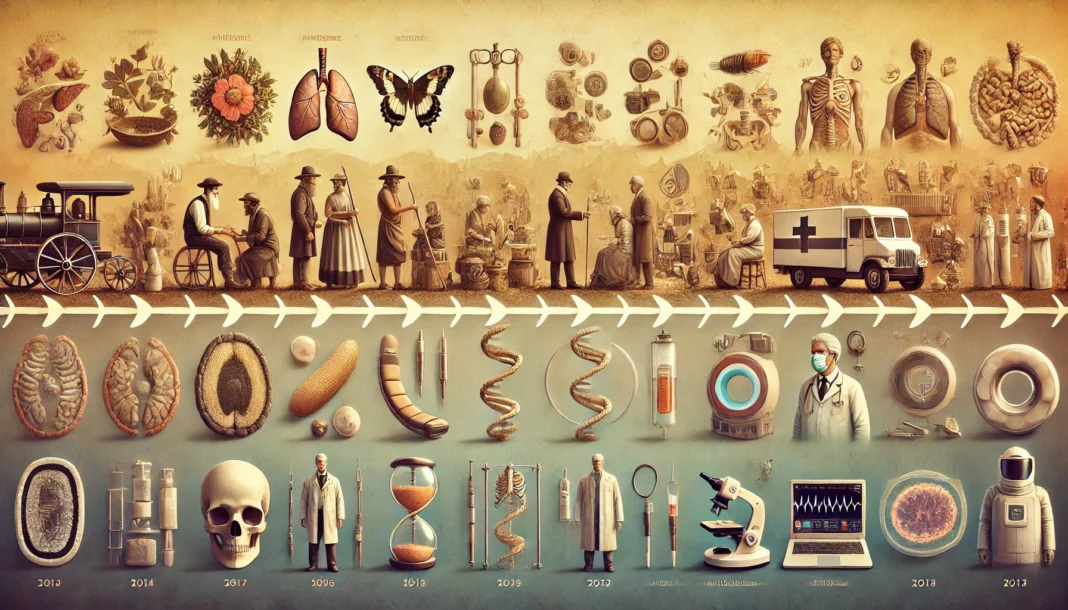Healthcare is evolving at an astonishing pace, driven by groundbreaking medical advancements and cutting-edge technologies. Today, we witness healthcare breakthroughs that are reshaping how patients are treated, diagnosed, and cared for, ultimately improving lives across the globe. The latest innovations in medical technology have created a shift toward a more personalized, digital, and efficient healthcare system. This article dives deep into the most recent advancements, including how artificial intelligence (AI), biotechnology, and minimally invasive treatments are transforming the face of modern medicine.
Understanding the Evolution of Modern Medicine
Modern medicine is the culmination of centuries of human effort to improve how diseases are treated. From the discovery of antibiotics to organ transplants, each breakthrough represents a step forward in providing better patient care. Additionally, new medications and surgical techniques have constantly pushed boundaries. In recent years, advancements in medical technology have taken us into a new era of healthcare, making treatments more efficient, personalized, and accessible.
Furthermore, technologies like AI and robotics have brought unprecedented precision to surgeries. Understanding these developments allows us to see how far we’ve come and where we’re heading. Moreover, the rise of telemedicine has made healthcare available to many who were previously underserved. As we explore these innovations, we also recognize the importance of continual improvement. Not only have these technologies enhanced outcomes, but they have also enabled better preventative care.
This evolution, therefore, signifies progress towards a healthier, more connected global population. Moreover, as medical technology continues to grow, we must adapt to these changes to make healthcare even more inclusive. Each advancement builds on past achievements, shaping a future where healthcare is efficient, accessible, and personalized for all.
Why Medical Technology Is Important for Improving Healthcare
Medical technology goes beyond merely treating illnesses; it focuses on enhancing patient quality of life. Moreover, it aims to improve overall health outcomes and well-being. Innovations such as wearable health monitors, AI-assisted diagnostics, and digital health solutions empower patients by giving them greater control over their own health.
Additionally, wearable monitors allow users to track their health status and share data with healthcare providers. These advancements provide not only convenience but also create a more connected and informed healthcare environment. Furthermore, digital health tools facilitate communication between patients and doctors, improving the speed and quality of care. As a result, patients are more engaged, informed, and proactive about managing their health.
These technologies also contribute to early diagnosis, helping to identify potential issues before they become serious. Hence, medical technology plays a crucial role in preventive healthcare. AI-assisted diagnostics, in particular, enhance accuracy and efficiency, leading to better patient outcomes. This integration of technology into healthcare systems is ultimately making healthcare more personalized and accessible. By combining various technological advancements, we are moving towards a future where individuals can manage their health proactively and collaboratively.
Key Advancements in Medical Technology
Recent advancements in medical technology are pushing the boundaries of what’s possible in healthcare.
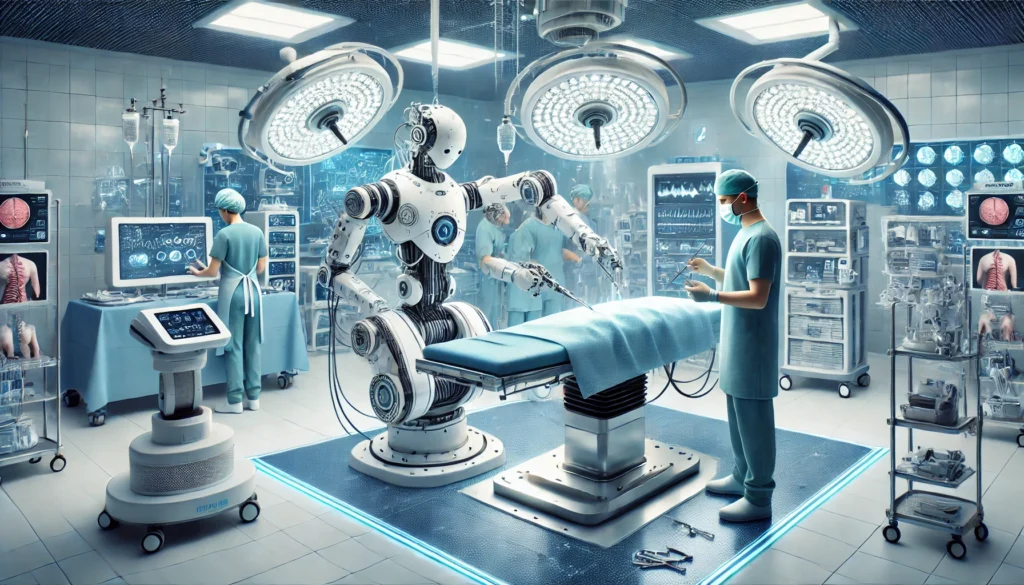
Robotics in Surgery and Healthcare Automation – Medical Technology
Surgical robots are becoming more common in operating rooms worldwide. Furthermore, they offer unique advantages that improve patient care significantly. These advanced machines allow for precision that is unmatched by human hands, enabling minimally invasive surgeries that reduce recovery time and complications. Additionally, they provide consistent accuracy, minimizing human error during procedures. For example, robotic-assisted laparoscopic surgery allows surgeons to operate with greater control and flexibility, leading to better patient outcomes.
Moreover, these robots offer enhanced visualization capabilities, allowing surgeons to see the surgical site in high definition and from multiple angles. As a result, they can perform intricate maneuvers that are often challenging in traditional surgery. This leads to fewer complications, reduced blood loss, and faster recovery times. Consequently, patients experience less postoperative pain and shorter hospital stays. Furthermore, robotic systems are evolving, incorporating artificial intelligence to assist in decision-making during surgeries.
This not only enhances efficiency but also supports surgeons in making more informed choices. In addition, surgical robots are contributing to the standardization of procedures, ensuring high-quality care across different healthcare settings. Overall, the adoption of surgical robotics represents a significant leap forward in achieving more precise and patient-friendly surgical care.
Wearable Health Technology for Real-Time Monitoring
Wearable devices such as smartwatches and fitness trackers are revolutionizing health monitoring. Moreover, they are empowering people to take charge of their well-being. They track vital signs like heart rate, sleep quality, and even oxygen levels, providing users with real-time data about their health.
Additionally, users can identify potential health issues early and take appropriate action. These gadgets not only offer personal insights but also help doctors monitor patients remotely, leading to timely interventions and better chronic disease management. Furthermore, remote monitoring is especially beneficial for those with limited access to healthcare facilities. As a result, patients feel more connected to their healthcare providers, which improves overall satisfaction.
These wearables also promote healthier lifestyles by encouraging users to meet daily activity goals. Hence, they motivate individuals to be more proactive about their health. In addition, the data collected by wearables can be shared with doctors, facilitating more accurate medical consultations. This shared information supports more personalized healthcare, tailored to individual needs. Moreover, continuous monitoring helps in managing chronic conditions like hypertension and diabetes more effectively. Therefore, wearable health technology is not only transforming individual health management but also contributing to more efficient healthcare systems overall.
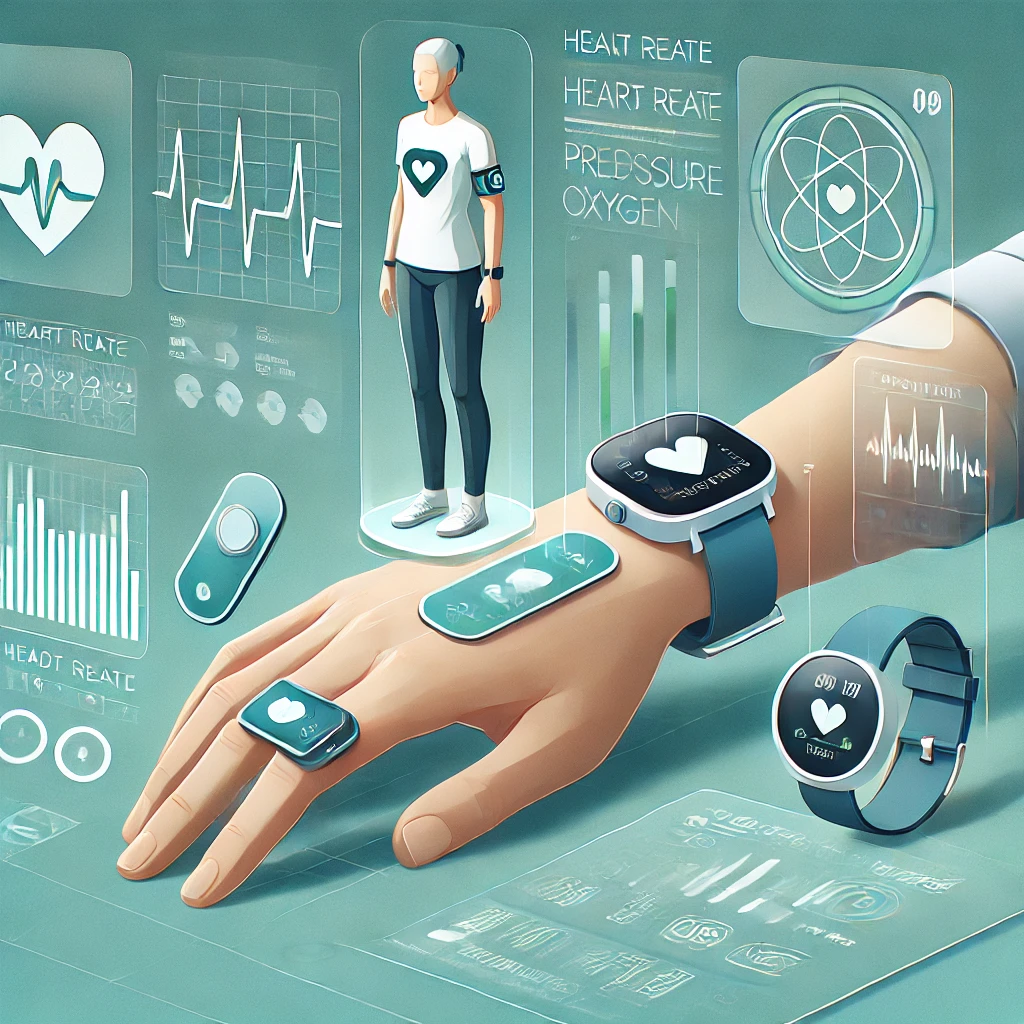
How AI and Machine Learning Are Transforming Medical Technology
AI in Diagnostics and Treatment Planning
Artificial intelligence is transforming healthcare by enhancing the ability to diagnose conditions quickly and accurately. Furthermore, it improves the efficiency of diagnostics significantly. AI-powered tools can analyze medical images, detect abnormalities, and even predict the likelihood of diseases.
Additionally, AI provides consistency that reduces human error in evaluations. For instance, AI has been used in radiology to identify tumors that might be missed by the human eye, thereby aiding early cancer detection and improving survival rates. Moreover, AI is helping in identifying patterns in large datasets, which is crucial for early diagnosis. As a result, doctors can offer treatment sooner, leading to better outcomes for patients. Consequently, AI’s role in diagnostics is becoming indispensable.
Predictive Analytics for Personalized Patient Care
AI and machine learning can analyze large datasets to predict health trends and suggest personalized treatments. Moreover, these technologies enable insights that would be impossible with traditional methods. Predictive analytics helps healthcare providers identify at-risk patients before symptoms worsen. Consequently, early intervention can prevent complications and reduce healthcare costs.
Furthermore, this timely approach helps in preventing hospital readmissions. This proactive approach means better, faster, and more tailored care, which is especially important for chronic diseases like diabetes and heart disease. Additionally, predictive analytics supports doctors in creating customized treatment plans.
Moreover, it enhances the precision of care based on individual patient data. As a result, patients receive care that is specifically aligned with their individual health needs. Therefore, AI and predictive analytics are driving a significant shift towards precision medicine, ultimately transforming healthcare into a more personalized experience.
Personalized Medicine: A New Era of Patient Care with Medical Technology
Personalized medicine is all about tailoring medical treatment to the individual characteristics of each patient. Instead of the one-size-fits-all approach, treatments are now being customized to fit the unique genetic makeup of an individual, leading to more effective outcomes.
Genetic Testing and Targeted Treatments with Modern Medical Technology
With advancements in genetic testing, doctors can now understand how different patients will respond to medications. Furthermore, this helps in predicting adverse drug reactions, making treatment safer. This is particularly useful in cancer treatment, where targeted therapies can be designed to attack only the cancer cells without harming healthy tissues, reducing side effects.
Additionally, personalized approaches ensure that patients receive the most effective medications for their unique genetic profiles. Consequently, treatment plans become more effective, and patient outcomes improve. Moreover, genetic insights are used to adjust dosages more precisely. This reduces the risk of under-treatment or over-treatment, further enhancing safety and efficacy.
Breakthrough Treatments Revolutionizing Healthcare
Gene Therapy and Its Role in Treating Genetic Disorders
Gene therapy is one of the most exciting breakthroughs in modern medicine. Furthermore, it represents a new frontier in treating diseases at their root cause. It involves modifying or replacing defective genes to treat or prevent diseases. Additionally, it aims to correct genetic abnormalities directly, rather than just managing symptoms.
Gene therapy has shown promise in treating genetic disorders such as cystic fibrosis and certain types of inherited blindness, offering hope to patients who previously had few options. Moreover, advancements in gene therapy techniques are improving safety and effectiveness. As a result, more genetic conditions are becoming treatable, which provides new opportunities for improved quality of life.
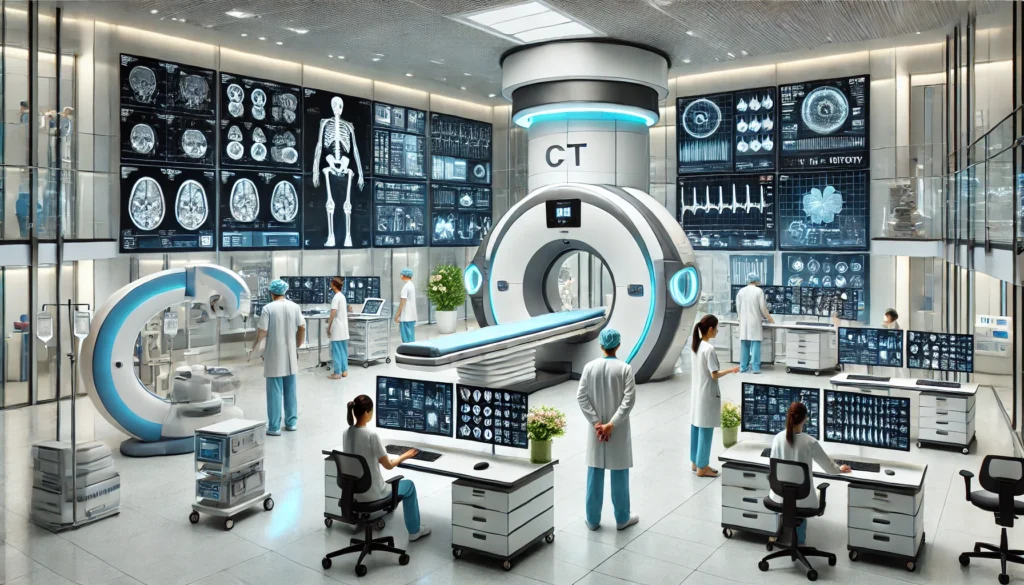
Immunotherapy for Cancer Treatment
Immunotherapy is another innovative treatment that uses the body’s immune system to fight cancer. Furthermore, it strengthens the immune system’s ability to recognize and attack cancer cells. Unlike traditional treatments like chemotherapy, immunotherapy is less likely to harm healthy cells and has been effective in treating cancers such as melanoma and certain types of lung cancer.
Additionally, it has shown success in cancers that are resistant to other treatments. By boosting the body’s natural defences, immunotherapy provides a powerful tool in the fight against cancer. Moreover, it helps in reducing tumor growth and improving patient survival rates. Consequently, immunotherapy is becoming an essential part of modern cancer care.
The Rise of Telemedicine and Digital Health Solutions
Benefits of Telehealth for Patients and Doctors
Telemedicine has transformed how healthcare is delivered, making it more accessible than ever before. Furthermore, it has simplified consultations, making healthcare convenient for everyone. Patients can now consult with doctors from the comfort of their homes, which is particularly beneficial for those in remote areas or with mobility issues.
Additionally, it is helpful for those with hectic schedules who struggle to find time for appointments. This technology has also reduced waiting times and allows doctors to manage more patients efficiently. Moreover, telemedicine reduces the strain on healthcare facilities, freeing resources for urgent cases. Consequently, healthcare delivery is becoming more efficient, timely, and widely accessible.
The Role of Mobile Apps in Managing Health
Mobile health apps are empowering people to take control of their own health. Moreover, they offer convenience and easy access to health information. From apps that track medication schedules to those that monitor vital signs, digital health tools are providing real-time insights and helping individuals make informed decisions about their health.
Additionally, these apps enable users to set reminders, ensuring medication adherence. As a result, users can stay on top of their treatment plans. Furthermore, health apps often include educational resources to help users understand their conditions better. Consequently, individuals feel more in control and proactive about their healthcare journey. Hence, these tools contribute significantly to better health outcomes.
Biotechnology: Improving Treatment and Diagnostics
Biotechnology has revolutionized how diseases are diagnosed and treated. Furthermore, it has improved the speed and accuracy of medical solutions. By using biological systems and organisms, biotechnology has made it possible to develop more effective treatments, vaccines, and diagnostic tools. Additionally, it supports innovative techniques that personalize patient care.
The rapid development of COVID-19 vaccines is an excellent example of how biotechnology can address global health challenges. Moreover, biotechnology plays a key role in early disease detection, which is crucial for timely intervention. As a result, healthcare outcomes have significantly improved, leading to better overall public health management. Consequently, biotechnology continues to drive progress in modern healthcare.
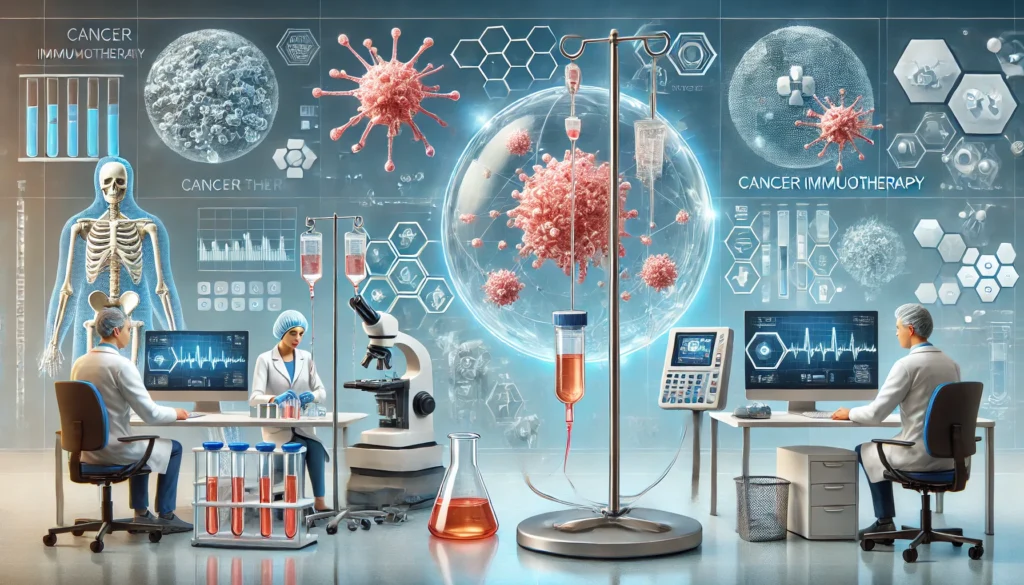
Challenges in Adopting Modern Medical Technology
While there are many benefits to adopting new medical technologies, there are also challenges that must be addressed.
High Costs and Accessibility Issues
The high cost of advanced medical technologies can make them inaccessible to many patients, particularly in low-income countries. Moreover, these financial barriers create significant inequality in healthcare access. Bridging this gap is essential to ensure that everyone benefits from these advancements, regardless of their economic status.
Additionally, efforts to subsidize costs or create affordable alternatives are crucial. Governments and healthcare providers must work together to improve affordability. Furthermore, public-private partnerships can help distribute advanced technologies more widely. By reducing costs, more patients can access life-saving treatments. Consequently, healthcare systems can become more inclusive, ultimately improving global health outcomes for all.
Data Privacy and Security Concerns
With the rise of digital health, data privacy has become a major concern. Moreover, the increasing use of online platforms for health records adds to this challenge. Patients’ personal health information is increasingly being stored online, making it vulnerable to cyberattacks. Additionally, unauthorized access to sensitive data can lead to severe privacy breaches.
Ensuring robust data security measures is vital to maintain trust and protect sensitive information. Furthermore, healthcare providers must implement strict protocols to safeguard patient data. Consequently, encryption, regular audits, and secure data storage play crucial roles. By adopting these measures, healthcare systems can enhance security and maintain patient confidence.
Future Trends in Medical Technology and Healthcare Breakthroughs
The future of healthcare is bright, with several exciting trends on the horizon.
Expansion of AI and Robotics in Healthcare
AI and robotics are expected to become even more integrated into healthcare, offering improved diagnostics, personalized care, and advanced surgical capabilities. We might soon see AI-powered healthcare assistants that can provide real-time medical advice or even perform certain tasks autonomously.
Advancements in Biotechnology and Regenerative Medicine
Regenerative medicine, which involves repairing or replacing damaged cells and tissues, is set to become more prominent. Techniques like stem cell therapy are already showing promise in treating conditions such as spinal cord injuries and degenerative diseases, potentially offering cures for previously untreatable conditions.
FAQs for Medical Technology
What are the latest healthcare breakthroughs?
How is modern medicine changing healthcare delivery?
What are the most innovative medical technologies today?
How does AI help in diagnostics and patient care?
What is personalized medicine and how does it benefit patients?
What are the benefits of telemedicine?
How are wearable health devices used in healthcare?
What role does biotechnology play in modern medicine?
What are the challenges facing medical technology adoption?
What are the future trends in medical technology?
Conclusion
Healthcare breakthroughs in modern medicine and medical technology are fundamentally changing how we think about health and wellness. From personalized medicine to the use of AI and telehealth, these innovations are not just improving patient outcomes but also making healthcare more efficient and accessible. As technology continues to advance, we can expect even more transformative changes that will benefit patients worldwide.
The journey toward a more advanced healthcare system is underway, and these breakthroughs are just the beginning. By staying informed and embracing these technologies, both patients and healthcare providers can contribute to a healthier, more connected world.

